Odessa Young Rediscovers Her Love for Scrappy Filmmaking With My First Film
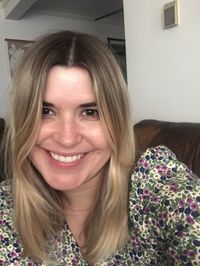
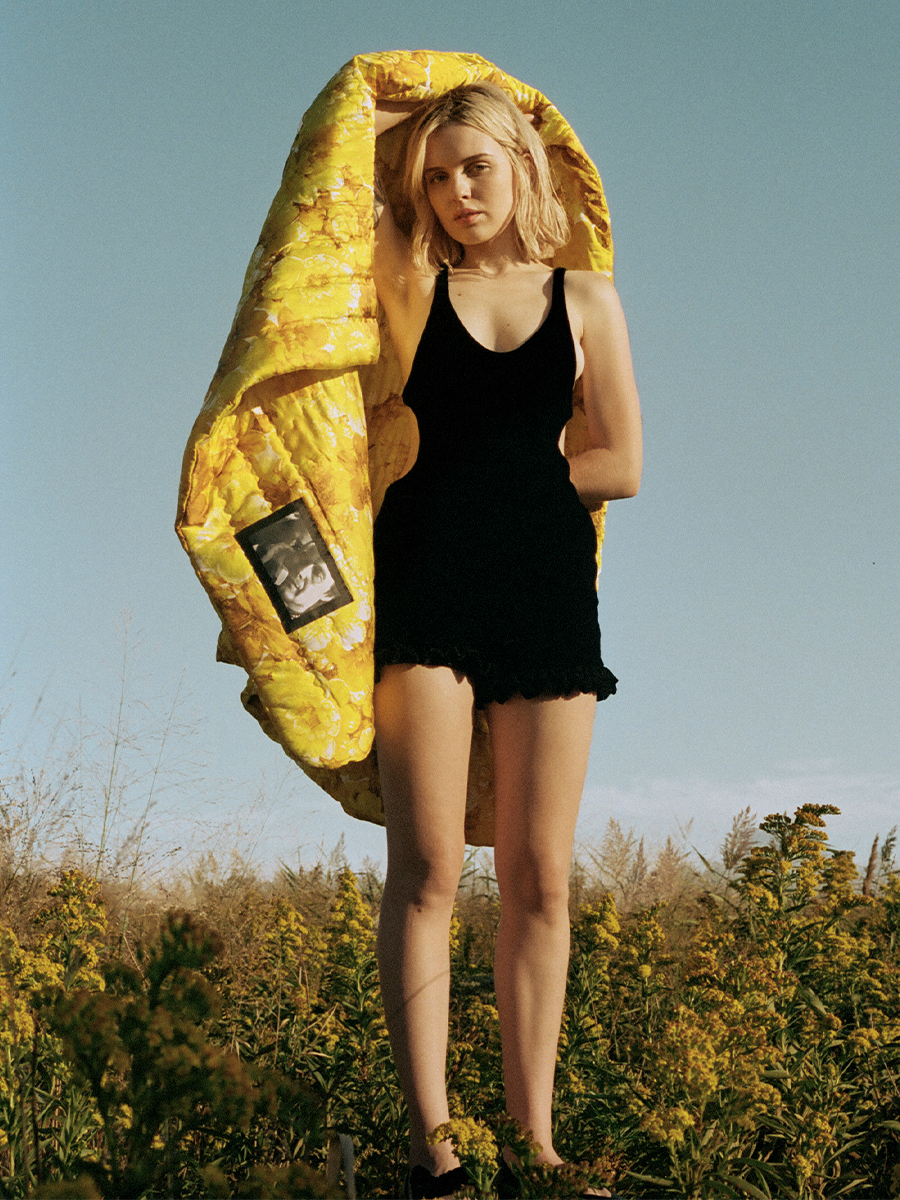
It's an early morning in late August, and Odessa Young is quick to warn me that her brain might not be completely dialed up just yet. Coincidentally, the sound of her coffee grinder clicks on a moment later. As a busy working actor, she's learned it's advantageous to not have any kind of circadian rhythm these days, and instead, she's developed a love of sleeplessness. It's worked well for the 26-year-old so far. Young has essentially been nonstop for the last 12 years, and her credits include Assasination Nation, A Million Little Pieces, and the HBO series The Staircase.
Eventually, with her pup insisting on being a part of the conversation, we settle in and focus our attention on the task at hand—talking about Young's latest project My First Film. It's a compelling and aching semi-autobiographical story written and directed by Zia Anger, and it's premiering on Mubi on September 6.
A one-off show in Brooklyn turned touring work of performance art, My First Film is a reenactment of Anger's doomed first feature 15 years later. At its center is a story about a young woman getting an abortion and directing her first film, but the narrative is complex, involving time jumps and a circuitous timeline that fuses fiction with real memories. Young, in a beautiful physical performance, serves as a proxy for Anger, an enthusiastic filmmaker whose inexperience and ego wreak havoc on an already-chaotic shoot. An examination of DIY filmmaking, the film is a testament to the collective energy necessary to create and what it means to make something and have it never come to fruition.
My First Film came into Young's life at a perfect time when she was in search of a scrappier way of filmmaking. What she'd get out of it was an eye-opening experience and a renewed perspective on what she wants and doesn't want in this industry.
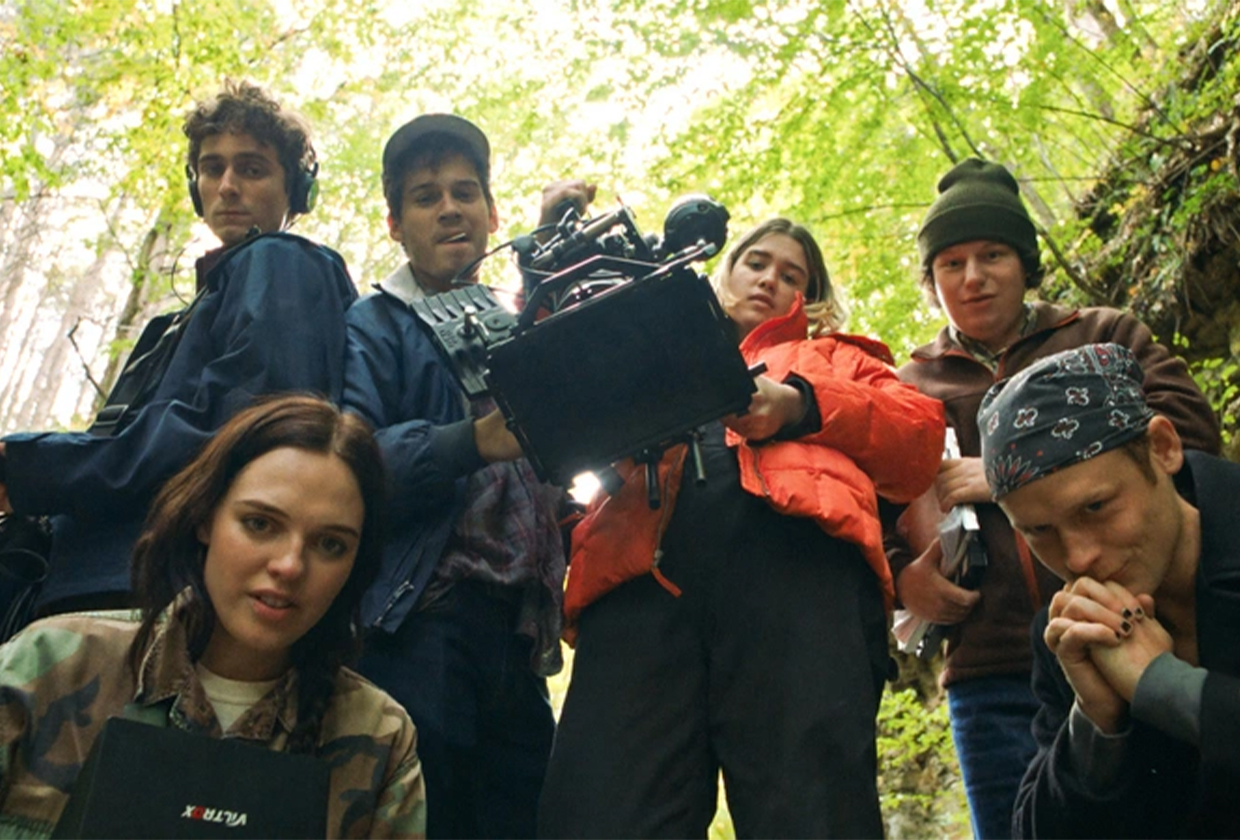
How did you first hear about My First Film coming together, and what really excited you about the project?
I had seen one of [Zia's] performances, and I was very taken with it. I've loved all of her music video work and short films. At the time, I was kind of friends with Taylor Shung, who is one of the producers, and I knew through friends of ours that she was working on Zia's film. All of a sudden, I opened my email, and there was a [message] from Taylor with a letter from Zia basically offering me the part. I didn't even have a meeting with her before she offered me the part. It's a nice development, I think, in one's career when kindred creators start [working together]. I would have admired Zia from afar for years, and I also would have never assumed that she knew my work or knew who I was. It's nice to think the people whose work I'm interested in are also interested in me, that whatever I have been putting out into the world has been attracting the right kind of people.
I had done some projects that had been bigger and less personal and less scrappy, and I feel really comfortable in the scrappy films. That's my favorite way to shoot. After working on TV, you start to worry that you're only ever going to be able to work on TV. I was worrying that I would get a little bit stuck in the serial world. Zia's film came at a time where I really wanted some confirmation that there is still a world for this kind of film and something that's very homegrown and DIY and scrappy and all of those good things but also has really good companies behind it and good money behind and is given the space and room to flourish and breathe.
How was that first meeting with Zia about the film, and what about her approach to storytelling and filmmaking really appealed to you?
She lives upstate, and at the time, I lived in Williamsburg. She came down to the city, and we had dinner. Part of the reason that I love her work and that I love her projects and that I was really interested in this project is because it forces me into having an ungodly amount of trust. … It's not easy for me to understand every part of it, but it is easy for me to know that she does. Going into the first meeting, I didn't know what her process was going to be like. I didn't know if we were going to rehearse or if she was going to explain anything to me or if she was going to leave it up to my interpretation. We sat down, and she was basically like, "I know that there's probably lots of questions that you have. … I'm just going to start from the beginning." For the next six months, she basically just told me the story of her life in great detail.
What were some of the other things you did during those six months with Zia in preparation for filming?
Well, I shared a lot too. I think that's ultimately what Vita, that character, became. It's not directly Zia, and it's not directly me, but she is this representation of permission. Vita gave both Zia and me the permission to really address these questions and discomforts that we had had. Aside from her story or her sharing, a lot of that preparation was also me basically matching her transparency, which was great. It's really nice to feel that art is justifying everything that you are going through in life. We also had really involved and extensive weeks-long rehearsals with Monica Mirabile, who is the movement director.
The portion of the film that is in the studio in the black box—which is this weird void that represents Zia's home office and where this breakdown happened for her—we knew that that needed to be a performance in and of itself. Basically, we shot the whole film as a performance in a day and a half. Those are the interstitials that you see in between the flashbacks of making the film. I learned the monologue of the entire film, and we choreographed it with Monica. … The edit changed things, and things were moved around. Sometimes, the film itself ended up feeling lighter or happier than the monologue, so you'd have to rerecord something. Otherwise, the voice-over would be sobbing, and there would be like a happy moment. Essentially, it was an incredibly involved process of learning performance art. Both Zia and Monica are performance artists, and I did performance art bootcamp with them for two weeks.
How cool! That must have been a really interesting experience unlike any other.
It really is, and I said this to Monica many times—I never want to do a job without her. She is a litmus test for truth. If you're not putting your full body into something, she can tell immediately, and she calls you up on it. There were times when developing that performance I might have fallen back on an old trick and relied on a representative performance style as opposed to something real coming out of me, and she would see it and call it out and encourage me to do something more truthful. I found that there were aspects of my performance, especially in that black-box stuff when [Monica] was working closely with us, that I was accessing things that I had not been able to before. That was a very fun development.
Was there a scene that felt particularly challenging for you in the moment or that made you nervous going into it?
So many. I was always nervous about trying to maintain the kind of energy that Vita has because I'm a very sleepy, slow person, and she's a very energetic, quick person. I think the most challenging scene ended up being the breakup scene in the woods with Dustin. … Phil [Ettinger], who plays Dustin, he's an incredible actor. Both him and I were scared by how bad it felt and how confusing it felt. When we were doing it, it felt like we were making mistakes. We would get out of [a] take, and we'd go up to Zia and be like, "Are we doing the right thing? How is this supposed to work?" Zia was like, "Yeah, it's working. It just feels bad. This is a breakup scene. It's supposed to feel really bad, and it's supposed to feel like a mistake, and it's supposed to feel confusing." I was always worried about seeing that scene because I really thought that I was going to watch it and think we really missed the mark. I don't think we did. I think it feels as messy and confusing and mistaken as it should.
That was one of those ones where you see it coming up on the call sheet, and you know you're going to have to cry and do this big thing and get a good night's sleep the night before. There's a lot of pressure on it, but you do have to just trust that whatever the scene brings out in you is the right thing.
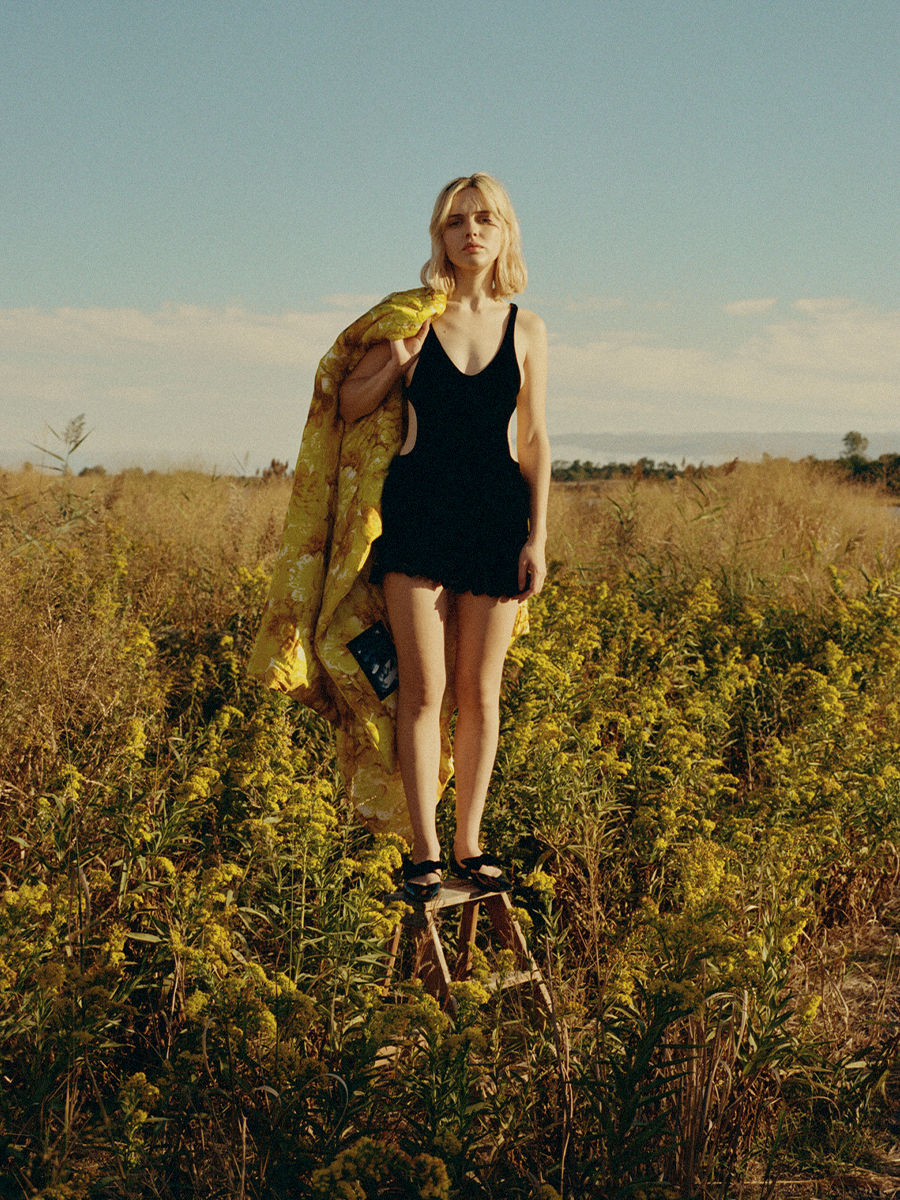
I'd love to talk about the abortion scene because I have never seen anything like it, and it felt like this surprisingly positive moment in the film.
It doesn't describe exactly what is going to happen in the script. I know that Joanna, who played the nurse, and Sarah [Michelson], who played the doctor, went away with Monica for a while and developed this choreography and really abstract but really beautiful performance piece from simple lines in the script. It was also one of the last things that we shot. We were able to shoot quite sequentially, so by the time we got to filming that scene, the whole film had been internalized in me, and there's this really magical thing that happens when you are in the last couple of days of filming, something where it clicks and you finally figure out what the film was about. You have to think about everything that you've done, and you start worrying. … Have I been doing the wrong thing the whole time?
I think what Zia needed out of that scene and what was incredibly important to her—probably more important than any other feeling in the film—was that the scene needed to feel extremely joyous and extremely loving. It needed to be this antithesis to abortion scenes in films. … Even if the film is largely pro-choice and abortion positive, there's a wallowing in the difficulty of this choice or this decision. I think Zia has felt really underrepresented by those kinds of scenes. In her experience, it was the most succinct act of self-love that she could have performed at the time this happened to her. It was a very emotional scene to film, and I think the penny dropped for a lot of people when we were filming that scene.
I'm curious—did making this film change your perspective on directing and filmmaking at all?
I don't know if it changed my perspective, but it definitely confirmed and deepened some of my truest beliefs about film, which is that it is an entirely collaborative art form, and it could never be anything but, and it should never be anything but. … It is ultimately in service of something collective and higher than any part of it. What I loved so much about working with Zia is she was raised in essentially an anarchistic commune with socialist values. She hasn't come to that in her life. She didn't find that for herself. It's just the way that she is. She has this baseline of someone who is so dedicated to the experience, not the result. I just found that very inspiring and very aspirational. That kind of way of creating doesn't have to be this whole statement, doesn't need to be this whole thing. It's just for the moment you are making something. I really hope that I can take that into everything that I do.
How has working on this film changed your view of future projects and/or roles? Has it altered what you are excited about?
I certainly have no desire to work on anything that is made with the intention of making money. I think intent is one of the only things that matters to me. I've started to develop a pretty well-tuned barometer for the intent of a project. Some people make films out of the joy of being able to collaborate, and some people make films in spite of having to collaborate. I only want to work with the former. That's been something that I've known probably my whole career, but I don't think I could have articulated it as succinctly as I can now had I not had this experience working on this film. There is no other way I would want it.
My First Film is available to watch on Mubi.
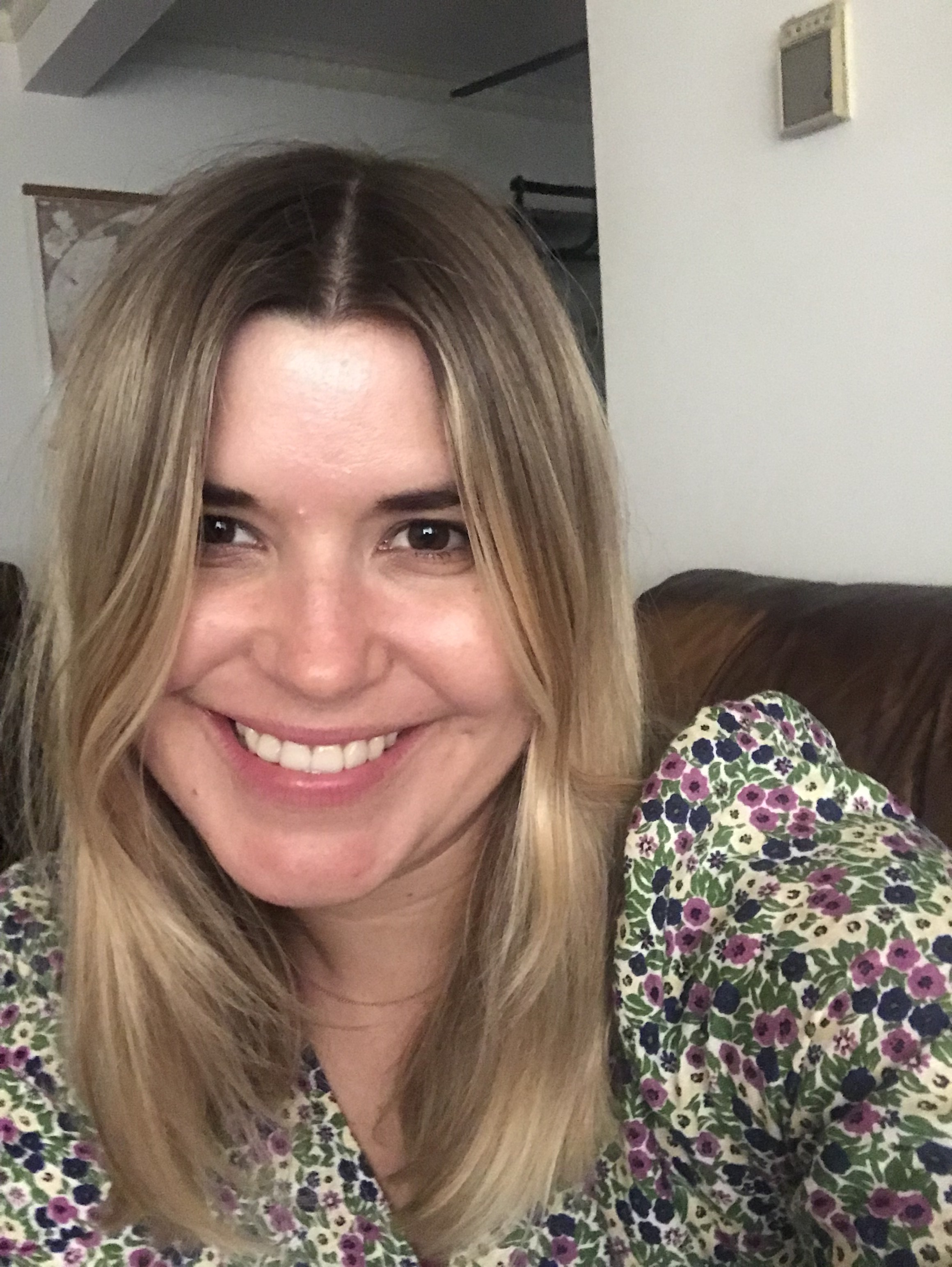
Jessica Baker has 16 years of experience in the digital editorial fashion and entertainment space. She is currently the Executive Director, Entertainment at Who What Wear where she ideates, books, writes, and edits celebrity and entertainment features.